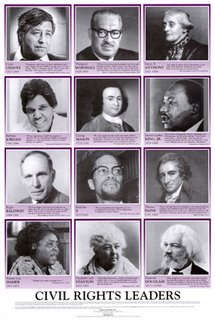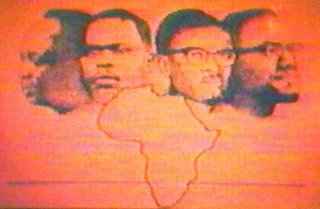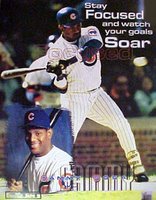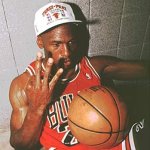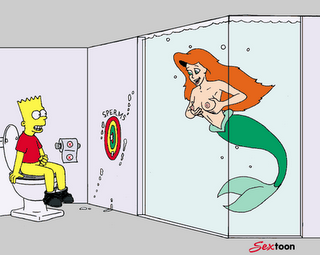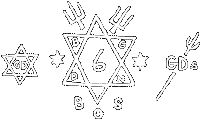

The Gangster Disciples, headed by
Larry Hoover, are one of the largest
African American street gangs in the
United States. Originally formed on the south side of
Chicago, they still have a wide presence there and in other
midwest cities. They are a part of the Folks coalition of gangs which includes the
Black Disciples,
Maniac Latin Disciples,
Spanish Cobras,
Simon City Royals and a number of others.
Symbols used by the Gangster Disciples include a six pointed star (
Star of David) in remembrance to one of the originators David Barksdale, (there is no connection to the
Jewish symbol) pitchforks, and a heart with wings, horns and a tail. The gangs colors are royal blue and black.
The Gangster Disciples are known to be involved in about $100 million a year of
drug trafficking.
Their main rivals are the
Vice Lords and
Black P. Stones.
This is what most of america thinks of the GD Nation, But there is a lot more involved than a few lines, lets see if any one wants to add to this.
Larry Hoover
The Black Gangster Disciples began as the Devil's Disciples in the 1950s in Englewood. In From Gangster Disciple to The Blueprint: Growth & Development, the
BGD explain their history in their own words.
David Barksdale was the most important leader of the Devils' Disciples and after his death, Shorty Freeman would run the Black Disciples.
Larry Hoover, who headed his own group, "The Family," eventually united with the Black Disciples and others and in the 1970s became the Black Gangster Disciple Nation.
In the 1980s, Hoover proclaimed a "new concept" of organizing the BGDN on corporate lines and became the "Chariman of the Board." He stressed education, economic development and political involvement, and eventually renamed the Black Gangsters "Growth and Development."
Gator Bradley's 1994 run for Third Ward alderman, chronicled for gangresearch.net by Greg Donaldson, was organized by Twenty-First Century VOTE, a vehicle for gang political involvement firmly in the Chicago tradition.
Currently, Hoover is in maximum security and federal indictments have incacerated large numbers of Gangster Disciple leaders. A war between the Gangster Disciples and Black Disciples continues although both gangs are influential in their southside neighborhoods.
The Gangster Disciples continue to be a major force within Illinois, Wisconsin, Indiana and other states prison systems.
The Chicago Gang History Project is writing a history of Chicago’s gangs from the immigrant settlements and ghetto of the 20th century to the changing neighborhoods and ghetto of the 21st.
No other group of Americans are more stereotyped than gangs. Yet, Chicago’s neighborhoods have always had gangs. The gangs have produced mayors and politicians, pro athletes, and businessmen. Gangs also have shed blood, sold drugs, and are filling the prisons.
The history of gangs is the history of Chicago. It is more than a story of crime, drugs, and violence. It is a story of immigrants and migrants, neighborhoods and nations, industry and deindustrialization, workers and entrepreneurs, masculinity and femininity, rebellion and resignation, nihilism and politics. It is a story of the persistance of the ghetto. In short, it is the story of Chicago, as told from its margins.
But why has Chicago had so many gangs? Why haven’t they gone away? How are they different today than the past, and how are they the same? These are the central issues we intend to explore.
The Chicago Gang History Project is interviewing current and former gang members and get on the record the views of those from the community, universities, and law enforcement who’ve been there. We are compiling documents of all types, photographs, interview transcripts, newspaper and magazine articles, and rare reports. We have constructed a website to share any non-confidential public information with the public:
http://www.uic.edu/orgs/kbc.
If you want to be interviewed, know some one who should be interviewed, or have any documents or photos on Chicago gangs, please contact us at kbc@uic.edu or 312-996-8361.
Chicago Gang Leader Propels the G.D.’sinto the Mainstream of Organized Crime
Hoover Convictions Most Significant Since Al Capone
Larry Michael HooverChairman of B.O.S & V.O.T.E11/30/50 Born in Jackson, Miss.1954 Moved to Chicago in1973 Locked up for 150 - 200 yrs. and saw the light of change1982 Gained a "Vision" of Better Growth & DevelopmentStarted B.O.S as well as 21 Centry V.O.T.E1997 - Now at Colorado State Pen.
Mr Hoovers View Points:
On prison life:" You become more conscious in prison- of life, of community, of your own mortality-- so you better understand the need for survival. You don't just see what's hapening to you, you see why it's happening, and can start thinking about makin changes to make sure it doesn't happen to you and your offspring in the future."
On gang political activism:" I realized that these street gangs could be the salvation of the community, because street gangs were at the core of most of the negative things goin on....If the leadership would start thinking positive then they could redirect that negative energy and become a viable part of the community." " You can't deal with street organizations from the outside....I've ben out there, I've done everything they have. I've robbed and been shot...so they can relate to me."
On Chicago politics:"[ Chicago's political machine] can't control the apathetic vote, and that's what I was advocating that we wake up- street gang members, people who live in the projects, homeless...Mayor Daley is afraid of me because he understands the potential of the type of movement I'm tryin to push..."
This Page is not to say join a gang but if you are in one make it positive, and while you are at it Vote peace.
Imprisoned Gangster Disciple leader Larry Hoover imagines himself as a great born-again visionary; a “Messiah of the streets” who has renounced all of the violence, the killing, and the drug-related mayhem that has blighted much of the South and West Sides of Chicago since the 1960s.The conviction of Larry Hoover is by far the single most important victory in the government’s war against organized crime in years. Hoover’s dope-peddling Gangster Disciples number in the tens of thousands. A criminal enterprise of such staggering proportions is no longer just a street gang. It is the new face of organized crime in a changing world. We better get used to it.Hoover contends that his Gangster Disciples - “G.D.’s” as they are known on the street, have ended the killing, the dope dealing, and the violence, and have attached a positive spin and a new name - “Growth and Development” - to what essentially remains a continuing criminal operation.Through 21st Century V.O.T.E., the political arm of the G.D.’s, and “Save the Children Promotions” sponsoring free concerts for kids, Hoover and his spokesman Wallace “Gator” Bradley have tried to legitimize and soft-pedal the activities of the gang who closely studied the lessons of history and their role model, Al Capone, who operated soup kitchens during the height of the Great Depression.“The jury in the Hoover trial delivered a simple message,” comments Dr. George W. Knox of the National Gang Crime Research Center at Chicago State University.“And that is, ‘Growth and Development’ is garbage. As a result of this conviction we are predicting demoralization among the G.D. membership, and de-stabilization at the top. We expect that low level members will defect from the G.D.’s and join other gangs, and the government should have an easier time cultivating informants from within.” In many respects Larry Hoover is the new Al Capone, and his highly centralized organization transcends the common designation of “street gang.” Chicago’s inner-city street gangs, for want of a better word, are just as efficient, cold-blooded, and lethal as the Mafia during its formative stages when the warring factions of New York gangland were consolidated into five “families” by Charles “Lucky” Luciano.Because the mayhem the gangs cause is for the most part confined to inner-city minority communities, there has been a dangerous tendency on the part of the media and the centers of power in downtown Chicago to ignore all of this blood letting because it does not intrude upon their world.Dangerous perceptions invite complacency and an air of complacency allows traditional and non-traditional organized crime to flourish. Despite Wallace Bradley’s strong efforts to legitimize the activities of the street gangs, knowledgeable community leaders like the Reverend Jeffrey G. Haynes, executive director of the Reach Out and Touch program on the South Side are absolutely convinced that its all for show - an elaborate scam hatched by “King Larry” or the “Chairman” as Hoover is referred to on the street.“The G.D.’s are very violent. They are thugs, assassins, and dope dealers, and this so-called “Growth and Development” is definitely a scam,” Haynes believes.“I know “Gator” [Bradley] (former 3rd Ward Aldermanic candidate) and he has to be accountable for his actions - enough for me to believe he’s involved in gang activity.” Haynes, who supervises a food pantry, a Teen Center, various park district programs, and is deeply involved in creating positive role models for disenfranchised inner-city youth, paints a grim picture of once stable South Side neighborhoods overrun by gangs and drugs. “Parents are afraid to send their kids to school,” he recounts. “Participation in sports is declining. You do not see youngsters playing sports in the public parks because they are afraid of gang intimidation. Older people cannot leave their houses and go to the stores because they fear being trapped in the cross-fire of drive-by shootings. Businesses close down because the overhead is too high to operate here successfully. Just try to find a Jewel food store in the inner-city. You can’t. The community has been taken by hostage by thugs.” Haynes describes 56th Street and Paulina Avenue as one of the worst sink holes of drugs and gang banging in the city. “Guns and dope are being sold in the alley all the time,” he said. “The people who live there ask themselves the hard question: will I be hit by a stray bullet today...or tomorrow?” In a bid to gain his freedom and escape mandatory life imprisonment stemming from indictments charging Larry Hoover and 39 of his henchmen with running a continuing criminal enterprise from the Vienna Correctional Center in downstate Illinois, defense attorney Anita Rivkin-Safer analogized Hoover’s background to the youthful indiscretions of Joseph Kennedy and Mayor Richard J. Daley. Our late Mayor was once a member in good standing of the Hamburg Athletic Club, described by historians as a kind of South Side “social-athletic” organization with a propensity for mischief. The story has been retold countlessly in Chicago literature. And of course, Joe Kennedy was a bootlegger during Prohibition. However, these analogies to famous men of the past and the skeletons in their closet, fell well short of the mark with the jury who voted to convict Larry Hoover and six co-defendants on drug conspiracy charges May 9th.
Buy Free Larry Hoover T-shirt
The recent federal jury conviction means that Hoover faces a life sentence in a harsh federal penitentiary where his connections to the outside world and to his gang, will be minimized. Communications from the state prison system through memos and verbal directives will end, thus creating organizational disarray at the top. “The sentence we anticipate for Mr. Hoover will hopefully guarantee that he will never, ever see parole,” beamed U.S. Attorney Jim Burns.“It is going to be very difficult for him in the federal penitentiary system to continue to meet and run the gang the way we know he did.” Government attorneys have spent years assembling a solid case against the leader of Chicago’s most lethal street gang, the Gangster Disciples, whose evolution from a violent band of street thugs into a highly organized and sophisticated group mirrors the historic evolution of La Cosa Nostra during its formative years. In the early 1970s, David Barksdale organized a coalition of street gangs in the Englewood neighborhood into a unified body which he called The Black Gangster Disciple Nation, forerunners of the “G.D.’s” founded in the Englewood neighborhood to counter the ambitions of the Black P Stone Nation. Barksdale, who was seriously wounded in a 1969 ambush, died five years later in 1974.Two of Barksdale’s proteges, Larry Hoover and Jerome “King Shorty” Freeman splintered the “Nation” into separate factions. Freeman gained control of the Black Disciples (B.D.’s) and has operated the gang independently ever since. The B.D.’s, identified by the six-pointed star, and crossed pitchforks are a part of the “Folks” alliance. Over the years they have fought a series of violent turf wars against the Black Gangster Disciple Nation (B.G.D.N.) for control of South Side drug distribution. Freeman, arrested in 1990 by the Chicago Police Gang Crimes Unit, is presently serving 28-years in an Illinois Penitentiary.Larry “King” Hoover, smarter and more resourceful than other gang leaders, took over the B.G.D.N. before this group was further fragmented into what is now known as the Gangster Disciples.Hoover favors the formalized approach to gang management. Beginning around 1981, his verbal instructions to his leadership outside the prison walls of Stateville took the form of business memoranda, just like a corporate C.E.O., or bank president might use to communicate with subordinates.Larry Hoover was much enamored with the organizational style of Jeff Fort, when Fort was building the Blackstone Rangers, a Woodlawn gang based at 67th and Woodlawn Avenue, into a criminal force to be reckoned with back in the 1960s. Fort and his sidekick, Eugene “Bull” Hairston organized about 250 neighborhood kids into an efficient army of shakedown artists and extortionists who terrorized the local business community....and then the community at large until Woodlawn had lost its economic base.Within a few years, after the retail store owners fled to safer locales, besieged Woodlawn began to resemble war-torn Beirut, pockmarked by bombs and gunfire. Fort dubbed his gang the “Rangers” after the elite U.S. Army military unit. Throughout the 1960s, the Rangers fought a series of bloody turf wars with their arch rivals, the Vice Lords of Lawndale, probably the oldest street gang in terms of longevity. They were founded at the Illinois State Training School For Boys in 1957. No-one is really certain just how many young men lost their lives by the time the blood-letting was over. The police did not keep accurate records of “ghetto killings” in those days.Today, the Vice Lords are a part of the “People” alliance which stand squarely in opposition to the Gangster Disciples who happen to belong to the “Folks” alliance of gangs.It is estimated that there are 40,000-50,000 G.D.’s active in Chicago, factoring in all of the “associates,” “Pee-Wee’s” (minors), and “Sisters of the Struggle” (female members). The Vice Lords remained a West Side operation through much of the 1970s and 1980s. After Willie Lloyd, leader of the Unknown Vice Lord faction was convicted of murder and robbery involving the slaying of an Iowa State trooper, a satellite faction of the Vice Lords was established in Minneapolis, where Lloyd was incarcerated. The gang has since established a beachhead in other Midwestern cities including Green Bay, Indianapolis, and Des Moines. The G.D.s are particularly strong on the South Side east of Halsted between 55th and 75th Streets, though in recent years the Mickey Cobras, a “People” gang, have made inroads and taken control of much of their former territory. Hoover, who is serving a 150-200 year sentence for the 1973 murder of William Young, reminisced about Fort with co-defendant Gregory Shell in a secret government recording made at the Vienna Correctional Center on November 6, 1993.“The church was getting quiet. You could hear a pin drop when he was walking through the aisles. So I told myself ah....I can have me a mob like that.” The secret recordings taken from tiny transmitters secretly embedded in badges given to visitors coming to the prison to visit Hoover, revealed the extent of his control over a multi-million-dollar drug distribution network run by Hoover from inside the walls of the Stateville and Vienna facilities.Defense attorneys for Hoover and the other indicted G.D.’s, attempted to suppress the admission of the tapes, contending that they are inaudible and should be barred. Last September, Government prosecutors secured a favorable ruling from (now retired) U.S. District Judge Brian Barnett Duff who ruled the tapes admissible after listening to just 30 minutes of the four hour tape. The tapes underscore what gang banging is all about - drug dealing and making money at the expense of human life. Cloaked in lies and deception, and borrowing heavily from religious teachings, the most sophisticated street gangs have issued handbooks and manuals delineating the “rules and laws” of the “nation” to their constituency. Codes of honor that bespeak of loyalty, sacrifice, fidelity, and understanding, suggest that Vice Lord or G.D. membership is akin to the by-laws of the Moose Lodge, the Elks, or an oath of loyalty given before God and country. Consider the carefully worded passage extracted from the “Faith of the Vice Lords.”“I dedicate myself to the dissemination of Lordism knowledge, and especially to the instruction of younger members of my profession in all its art and tradition....To my Lord brothers I pledge in the same full measure I ask of them, integrity, fair dealing, tolerance, respect, and devotion to the high standards and dignity of our profession. With the consciousness always that our special expertness carries with it the obligation to serve humanity with complete sincerity...is it not the pride of I, that I say, I am proud to be Vice Lord! I am proud to live, display, reflect, and love Vice Lord, with the highest devotion, loyalty, and honor.”Reverend Haynes and others who have witnessed the horror that the gangs inflict upon the community, despite the Vice Lords high-sounding rhetoric, believe that the only solution is to give police the proper tools to work with to eradicate the scourge. “The modification of the 1981 Consent Decree [limiting the Chicago Police Department’s intelligence gathering capability in response to the Red Squad’s infiltration tactics against anti-war groups in the 1960s] would help a lot,” Haynes believes. “Vietnam and the 1960s are over with. The Red Squad is irrelevant to what is going down today,” Haynes adds. “It is time to give the police the power they need to do the job. Either we continue living in fear, or we have to trust our police to rid the community of violence.”Dr. George Knox an authority on national gang crime, believes that the Hoover conviction represents a tremendous reprieve for federal law enforcement. “The outcome of this trial restores public confidence in the abilities of law enforcement, and it will send a clear and powerful message to the communities that the system does work.”

















